At the recently held 2024 PV Green Supply Chain Forum, the Public Environmental Research Center (IPE) and Lvse Jiangnan (PECC) released the results of the first CATI index evaluation of listed PV companies' corporate climate actions, and ten listed PV companies, including LONGi Green Energy (601012), JinkoSolar (688223), and Atlas (688472), have been recognized as leaders in the climate action rankings due to their active promotion of green and low-carbon transformation. The PV industry's overall climate performance is still to be improved.
The Corporate Climate Action CATI Index is compiled by IPE with technical support from the China Research Academy of Environmental Sciences. In order to quantitatively assess the progress of low-carbon transition of PV enterprises and promote PV enterprises to build a green and low-carbon supply chain, IPE and Green Gangnam set up a project team in early 2024 to launch the evaluation of CATI index for PV enterprises, with a total of 42 relevant listed companies covered in the first phase.
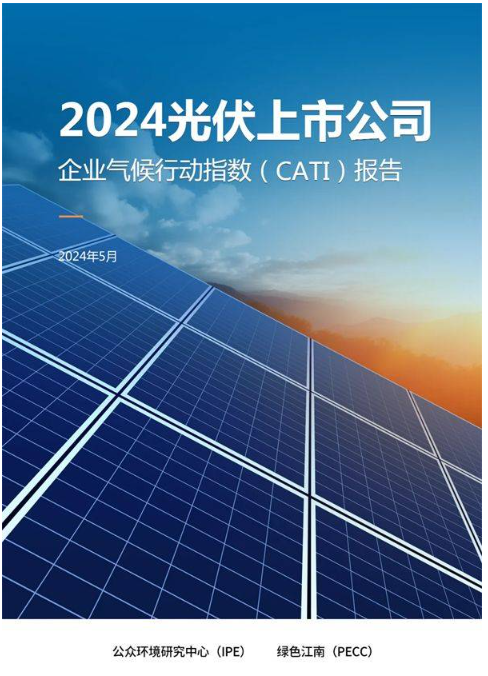
2024 CATI Report on Corporate Climate Action Index for Listed PV Companies
The results of the first CATI index evaluation of listed PV companies' corporate climate action show that LONGi Green Energy (601012), JinkoSolar (688223), and AT&S (688472) are in the top three, while Trina Solar (688599), JA Solar (002459), Tongwei (600438), TCL Central (002129), Sunny Power ( 300274), GCL Technology (03800) and Xinyi Photovoltaic (00968) entered the TOP 10.
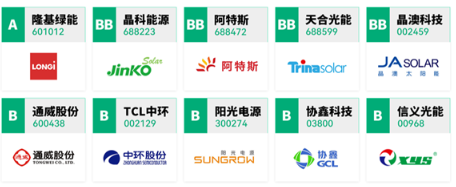
2024 CATI Evaluation of Listed PV Companies TOP10
As the only enterprise rated A, LONGi Green Energy (601012) not only actively carries out the disclosure of corporate level scope 1, 2 and 3 emissions, as well as the measurement and disclosure of product carbon footprints, but also takes the lead in the industry to carry out the accounting and disclosure of suppliers' carbon emissions, and also sets and tracks supply chain emission reduction targets on this basis and tries to cooperate with major suppliers to reduce emissions through the launching of the "Supply Chain Green Partner Empowerment Program". We have also set and tracked supply chain emission reduction targets on this basis, and through the launch of the "Supply Chain Green Partner Empowerment Program", we have attempted to reduce emissions in cooperation with key supplier partners.
JinkoSolar (688223), Atos (688472), Trina Solar (688599) and JA Solar (002459), which have been rated BB, have begun to formulate green procurement requirements and gradually implement supply chain emission reduction actions. Among them, Atlas responded to overseas export requirements such as France's carbon footprint by releasing a roadmap for reducing the carbon footprint of its products and gradually advancing the reduction of its products' carbon footprint.
Tongwei (600438), TCL Central (002129), Sunny Power (300274), GCL Technology (03800) and Xinyi Photovoltaic (00968), which were awarded B grades, have performed well in the areas of supply chain low-carbon transformation path design and supplier carbon accounting empowerment.
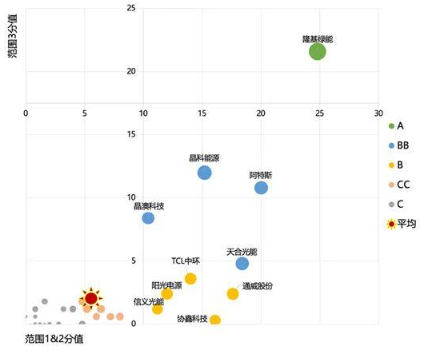
Distribution of CATI evaluation performance of photovoltaic enterprises
(The X-axis represents the sum of the enterprise's Scope 1 & 2 indicator scores, and the Y-axis represents the sum of the Scope 3 indicator scores.)
The CATI index quantitatively evaluates corporate climate action performance in five dimensions: governance mechanism, measurement and disclosure, carbon target setting, carbon target performance, and emission reduction actions. This evaluation shows that in terms of governance and management, 33 PV companies have begun to formulate and publish climate policies, and 17 have incorporated climate-related issues into the oversight responsibilities of the top decision-making level of the board of directors. In terms of measurement and disclosure, 18 companies have accounted for and disclosed Scope 1 & 2 emissions, 6 have carried out Scope 3 emissions accounting and disclosure, and 10 have accounted for and disclosed product carbon footprint information.
In terms of target setting, 8 PV companies have set and disclosed Scope 1&2 emission reduction targets, and 3 companies have included Scope 3 in their climate targets. 2 companies, LONGi Green Energy (601012) and JinkoSolar (688223), have already obtained the Science Based Targets Initiative (SBTi) certification. (6012) and JinkoSolar (688223) have achieved Science Based Targets Initiative (SBTi) certification; three companies have proposed to achieve Scope 1&2 carbon neutrality by 2050; and six companies have pledged to use 100% renewable energy in their operations by 2030.
The evaluation of this issue shows that 29 PV enterprises actively carry out renewable energy utilization. Enterprises have improved the proportion of renewable energy utilization through self-built photovoltaic projects in their factories, direct signing of green power procurement agreements with suppliers, and procurement of energy attribute certificates. Lvse Jiangnan's on-site research on 61 subsidiaries of some participating PV enterprises shows that 70% of PV enterprises have built their own rooftop PV projects, and most of them have a rooftop PV coverage rate of more than 50%. 28 enterprises have carried out actions to reduce emissions through energy efficiency enhancement, substitution of advanced processes, or targeting mobile source emissions, while 18 have carried out systematic energy management to save energy and reduce carbon emissions.
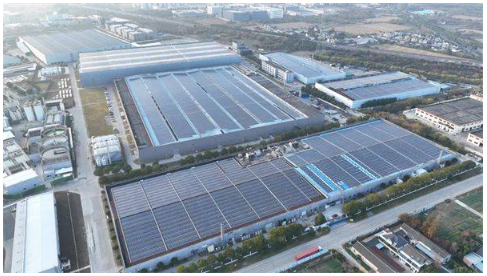
Zhejiang JinkoSolar Rooftop PV
In terms of promoting the construction of low-carbon supply chain, 6 PV enterprises publicly disclosed that they promoted suppliers to carry out corporate carbon accounting or energy management projects, of which 3, LONGi Green Energy (601012), JA Solar (002459) and TCL Central (002129), further disclosed the emission reduction projects they carried out in cooperation with their product production and logistics suppliers.
Nevertheless, most PV companies still score significantly low, with as many as 26 C-ranked PV listed companies scoring low, with an average score of only 3.38 points. In addition to the top-ranked leading companies, most PV companies are still focusing on Scope 1&2 measurement and emission reduction, and have yet to clarify the low-carbon transition path for Scope 3, which is mainly supply chain emissions; 80% of PV companies have yet to effectively carry out green supply chain management; and a small number of PV companies, which have already committed to the Scope 3 climate goal, have yet to implement supply chain emission reduction actions. In the downstream of the value chain, the emission reduction potential of waste PV product recycling has yet to be effectively explored, and the establishment of a standardized treatment and recycling system needs to be accelerated.
Direct and indirect GHG emissions from enterprises are categorized into three "scopes", with scope 1 emissions referring to direct GHG emissions from sources owned or controlled by the enterprise. Scope 2 emissions are indirect GHG emissions from the use of purchased electricity, heating/cooling, or steam. Scope 3 emissions are all other indirect GHG emissions in the enterprise's value chain.
The group found that as one of the key paths to achieve global net-zero emissions, the new energy industry, including photovoltaic power generation, is developing rapidly under the impetus of the global zero-carbon sprint.COP28, the first stocktaking after the adoption of the Paris Agreement, has made it clear that the world is going to realize the transition from fossil energy sources, and strive to triple the installed capacity of renewable energy sources globally by 2030, which will make the renewable energy predictability significantly, will create new opportunities for related industries. At present, China's PV industry has developed into an undisputed global leader. Expanding overseas markets will not only help accelerate the global energy transition, but also facilitate the development of China's PV industry.
However, the group also pointed out that the success or failure of the global energy transition of this emerging industry, inevitably become the focus of global industrial competition. Many countries have introduced corresponding industrial incentives aimed at increasing investment and financing and creating local PV value chains. In the context of geopolitical tensions, supply chain security has also been given unprecedented importance, which is reflected in trade policies, with protectionist tendencies emerging in several key regions around the world. Some regions have tightened the green entry barriers to the PV market through rules such as carbon footprint limits for PV products, eco-design, and eco-labeling.
In view of the PV industry's silicon, wafer modules and other products manufacturing, as well as upstream and downstream transportation and distribution and disposal of discarded PV modules will consume a large amount of energy and water resources, and accordingly produce a large amount of carbon emissions and pollutant emissions, as well as a large amount of waste, the group suggests that China's photovoltaic enterprises to pay attention to the development trend of the global green trend, to accelerate the promotion of their own industrial chain of the green and low-carbon transformation, from focusing on The group suggests that Chinese PV enterprises should pay attention to the global green development trend, accelerate the green and low-carbon transformation of their own industrial chain, and shift from focusing on "manufacturing green" to "manufacturing green" and "green manufacturing".
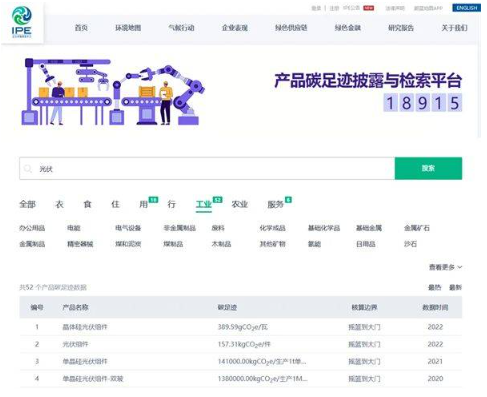
Product Carbon Footprint Disclosure and Retrieval Platform
Against the backdrop of the growing importance of the industry's internal volumes and overseas markets, the group reminds Chinese PV companies to pay attention to the current international and Chinese requirements for corporate climate disclosure, including a series of documents adopted by the European Union, such as the Corporate Sustainability Reporting Directive (CSRD), the climate-related disclosure guidelines issued by the International Sustainable Development Board (ISSB), the climate information disclosure and sustainability disclosure frameworks formulated by the Hong Kong Stock Exchange and the Northern Stock Exchange, as well as the Guidelines on Corporate Greenhouse Gas Emissions Disclosure and a series of accounting and disclosure standards under preparation by relevant agencies of the competent ministries and commissions. We will enhance the level of climate information disclosure for ourselves and our supply chain through the Climate Disclosure and Sustainability Disclosure Framework developed by the Hong Kong Stock Exchange and the Shanghai Stock Exchange, as well as the Guidelines for Disclosure of Greenhouse Gas Emissions by Enterprises and a series of accounting and disclosure standards led by the relevant organizations of the competent ministries and commissions.
The 2024 PV Green Supply Chain Forum was hosted by Alashan SEE Dongwu Project Center, SIP Lvse Jiangnan Public Environment Concerned Centre, and Public Environmental Research Center, and co-organized by Jiangsu Photovoltaic Industry Association and Suzhou Photovoltaic Industry Association. A total of 180 Chinese and foreign guests attended the forum, including experts from relevant ministries and research institutions, representatives of local governments and international organizations, representatives of industry associations and PV enterprises, as well as NGOs and third-party organizations.
At the forum, representatives from Alashan SEE Dongwu Project Center, Lvse Jiangnan, Jiangsu PV Industry Association, Atlas Sun, LONGi Green Energy, Tongwei, Trina Solar, and Maiwei jointly launched the PV industry green supply chain action initiative. The initiative hopes that leading brands in the domestic PV industry can set a good example of green supply chain, take the lead in green supply chain management, and tell the story of China's PV green supply chain.
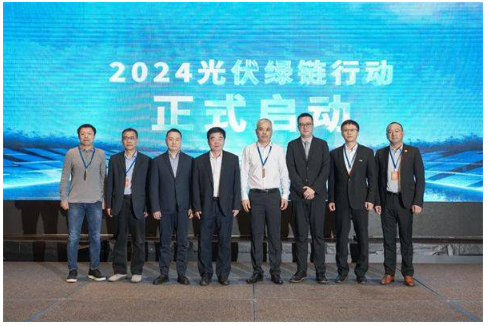
In response to the urgent global climate situation, this issue of the report also introduces the Towards a Zero-Carbon Supply Chain Initiative, which is soliciting companies and stakeholders to join, and advocates that leading PV companies with supply chain influence and climate ambitions, industry organizations and key institutions drive the core of the PV supply chain to join the Zero-Carbon Sprint, and at the same time, promote more small and medium-sized enterprises (SMEs) to join the global climate process. Colleagues of the group advocate that all sectors of society, including governments, investors, research institutions, etc., should pay attention to and support the green and low-carbon transformation of the PV industry, join hands to promote the decarbonization process of the PV supply chain, make a greater contribution to the global transition away from fossil fuels, and jointly safeguard the Earth's homeland.
